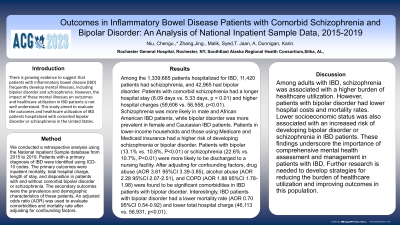Monday Poster Session
Category: IBD
P2183 - Outcomes in Inflammatory Bowel Disease Patients With Comorbid Schizophrenia or Bipolar Disorder: An Analysis of National Inpatient Sample Data, 2015-2019
Monday, October 23, 2023
10:30 AM - 4:15 PM PT
Location: Exhibit Hall

Has Audio
- CN
Chengu Niu, MD
Rochester General Hospital
Rochester, NY
Presenting Author(s)
Chengu Niu, MD1, Jing Zhang, MD2, Tausif Syed, MD1, Ali Jaan, MD1, Karin Dunnigan, MD1
1Rochester General Hospital, Rochester, NY; 2Rainier Springs Hospital, Vancouver, WA
Introduction: There is growing evidence to suggest that patients with inflammatory bowel disease (IBD) frequently develop mental illnesses, including bipolar disorder and schizophrenia. However, the impact of these mental illnesses on outcomes and healthcare utilization in IBD patients is not well understood. This study aimed to evaluate the outcomes and healthcare utilization of IBD patients hospitalized with comorbid bipolar disorder or schizophrenia in the United States.
Methods: We conducted a retrospective analysis using the National Inpatient Sample database from 2015 to 2019. Patients with a primary diagnosis of IBD were identified using ICD-10 codes. The primary outcomes were inpatient mortality, total hospital charge, length of stay, and disposition in patients with and without comorbid bipolar disorder or schizophrenia. The secondary outcomes were the prevalence and demographic characteristics of these patients.
Results: Among the 1,339,665 patients hospitalized for IBD, 11,420 patients had schizophrenia, and 42,965 had bipolar disorder. Patients with comorbid schizophrenia had a longer hospital stay (8.09 days vs. 5.33 days, p < 0.01) and higher hospital charges (59,606 vs. 56,558, p< 0.01). Schizophrenia was more likely in male and African American IBD patients, while bipolar disorder was more prevalent in female and Caucasian IBD patients. Patients in lower-income households and those using Medicare and Medicaid insurance had a higher risk of developing schizophrenia or bipolar disorder. Patients with bipolar (13.1% vs. 10.8%, P< 0.01) or schizophrenia (22.6% vs. 10.7%, P< 0.01) were more likely to be discharged to a nursing facility. After adjusting for confounding factors, drug abuse (AOR 3.61 95%CI 3.39-3.85), alcohol abuse (AOR 2.28 95%CI 2.07-2.51), and COPD (AOR 1.88 95%CI 1.78-1.98) were found to be significant comorbidities in IBD patients with bipolar disorder. Interestingly, IBD patients with bipolar disorder had a lower mortality rate (AOR 0.70 95%CI 0.54-0.92) and lower total hospital charge (46,113 vs. 56,931, p< 0.01).
Discussion: Among adults with IBD, schizophrenia was associated with a higher burden of healthcare utilization. However, patients with bipolar disorder had lower hospital costs and mortality rates. Lower socioeconomic status was also associated with an increased risk of developing bipolar disorder or schizophrenia in IBD patients. These findings underscore the importance of comprehensive mental health assessment and management in patients with IBD.

Disclosures:
Chengu Niu, MD1, Jing Zhang, MD2, Tausif Syed, MD1, Ali Jaan, MD1, Karin Dunnigan, MD1. P2183 - Outcomes in Inflammatory Bowel Disease Patients With Comorbid Schizophrenia or Bipolar Disorder: An Analysis of National Inpatient Sample Data, 2015-2019, ACG 2023 Annual Scientific Meeting Abstracts. Vancouver, BC, Canada: American College of Gastroenterology.
1Rochester General Hospital, Rochester, NY; 2Rainier Springs Hospital, Vancouver, WA
Introduction: There is growing evidence to suggest that patients with inflammatory bowel disease (IBD) frequently develop mental illnesses, including bipolar disorder and schizophrenia. However, the impact of these mental illnesses on outcomes and healthcare utilization in IBD patients is not well understood. This study aimed to evaluate the outcomes and healthcare utilization of IBD patients hospitalized with comorbid bipolar disorder or schizophrenia in the United States.
Methods: We conducted a retrospective analysis using the National Inpatient Sample database from 2015 to 2019. Patients with a primary diagnosis of IBD were identified using ICD-10 codes. The primary outcomes were inpatient mortality, total hospital charge, length of stay, and disposition in patients with and without comorbid bipolar disorder or schizophrenia. The secondary outcomes were the prevalence and demographic characteristics of these patients.
Results: Among the 1,339,665 patients hospitalized for IBD, 11,420 patients had schizophrenia, and 42,965 had bipolar disorder. Patients with comorbid schizophrenia had a longer hospital stay (8.09 days vs. 5.33 days, p < 0.01) and higher hospital charges (59,606 vs. 56,558, p< 0.01). Schizophrenia was more likely in male and African American IBD patients, while bipolar disorder was more prevalent in female and Caucasian IBD patients. Patients in lower-income households and those using Medicare and Medicaid insurance had a higher risk of developing schizophrenia or bipolar disorder. Patients with bipolar (13.1% vs. 10.8%, P< 0.01) or schizophrenia (22.6% vs. 10.7%, P< 0.01) were more likely to be discharged to a nursing facility. After adjusting for confounding factors, drug abuse (AOR 3.61 95%CI 3.39-3.85), alcohol abuse (AOR 2.28 95%CI 2.07-2.51), and COPD (AOR 1.88 95%CI 1.78-1.98) were found to be significant comorbidities in IBD patients with bipolar disorder. Interestingly, IBD patients with bipolar disorder had a lower mortality rate (AOR 0.70 95%CI 0.54-0.92) and lower total hospital charge (46,113 vs. 56,931, p< 0.01).
Discussion: Among adults with IBD, schizophrenia was associated with a higher burden of healthcare utilization. However, patients with bipolar disorder had lower hospital costs and mortality rates. Lower socioeconomic status was also associated with an increased risk of developing bipolar disorder or schizophrenia in IBD patients. These findings underscore the importance of comprehensive mental health assessment and management in patients with IBD.

Figure: IBD with schizophrenia
Disclosures:
Chengu Niu indicated no relevant financial relationships.
Jing Zhang indicated no relevant financial relationships.
Tausif Syed indicated no relevant financial relationships.
Ali Jaan indicated no relevant financial relationships.
Karin Dunnigan indicated no relevant financial relationships.
Chengu Niu, MD1, Jing Zhang, MD2, Tausif Syed, MD1, Ali Jaan, MD1, Karin Dunnigan, MD1. P2183 - Outcomes in Inflammatory Bowel Disease Patients With Comorbid Schizophrenia or Bipolar Disorder: An Analysis of National Inpatient Sample Data, 2015-2019, ACG 2023 Annual Scientific Meeting Abstracts. Vancouver, BC, Canada: American College of Gastroenterology.
